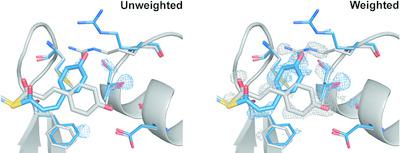当前位置:
X-MOL 学术
›
J. Appl. Crystallogr.
›
论文详情
Our official English website, www.x-mol.net, welcomes your
feedback! (Note: you will need to create a separate account there.)
reciprocalspaceship: a Python library for crystallographic data analysis
Journal of Applied Crystallography ( IF 5.2 ) Pub Date : 2021-09-04 , DOI: 10.1107/s160057672100755x Jack B Greisman 1 , Kevin M Dalton 1 , Doeke R Hekstra 1, 2
Journal of Applied Crystallography ( IF 5.2 ) Pub Date : 2021-09-04 , DOI: 10.1107/s160057672100755x Jack B Greisman 1 , Kevin M Dalton 1 , Doeke R Hekstra 1, 2
Affiliation

|
Crystallography uses the diffraction of X-rays, electrons or neutrons by crystals to provide invaluable data on the atomic structure of matter, from single atoms to ribosomes. Much of crystallography's success is due to the software packages developed to enable automated processing of diffraction data. However, the analysis of unconventional diffraction experiments can still pose significant challenges – many existing programs are closed source, sparsely documented, or challenging to integrate with modern libraries for scientific computing and machine learning. Described here is reciprocalspaceship, a Python library for exploring reciprocal space. It provides a tabular representation for reflection data from diffraction experiments that extends the widely used pandas library with built-in methods for handling space groups, unit cells and symmetry-based operations. As is illustrated, this library facilitates new modes of exploratory data analysis while supporting the prototyping, development and release of new methods.
中文翻译:

reciprocalspaceship:用于晶体学数据分析的 Python 库
晶体学利用晶体的 X 射线、电子或中子衍射来提供有关物质原子结构(从单个原子到核糖体)的宝贵数据。晶体学的成功很大程度上归功于为实现衍射数据的自动处理而开发的软件包。然而,非常规衍射实验的分析仍然会带来重大挑战——许多现有程序是闭源的、文档很少,或者难以与现代科学计算和机器学习库集成。这里描述的是reciprocalspaceship ,一个用于探索倒数空间的 Python 库。它提供了来自衍射实验的反射数据的表格表示,通过处理空间群、晶胞和基于对称性的操作的内置方法扩展了广泛使用的pandas库。如图所示,该库促进了探索性数据分析的新模式,同时支持新方法的原型设计、开发和发布。
更新日期:2021-10-06
中文翻译:

reciprocalspaceship:用于晶体学数据分析的 Python 库
晶体学利用晶体的 X 射线、电子或中子衍射来提供有关物质原子结构(从单个原子到核糖体)的宝贵数据。晶体学的成功很大程度上归功于为实现衍射数据的自动处理而开发的软件包。然而,非常规衍射实验的分析仍然会带来重大挑战——许多现有程序是闭源的、文档很少,或者难以与现代科学计算和机器学习库集成。这里描述的是reciprocalspaceship ,一个用于探索倒数空间的 Python 库。它提供了来自衍射实验的反射数据的表格表示,通过处理空间群、晶胞和基于对称性的操作的内置方法扩展了广泛使用的pandas库。如图所示,该库促进了探索性数据分析的新模式,同时支持新方法的原型设计、开发和发布。











































 京公网安备 11010802027423号
京公网安备 11010802027423号